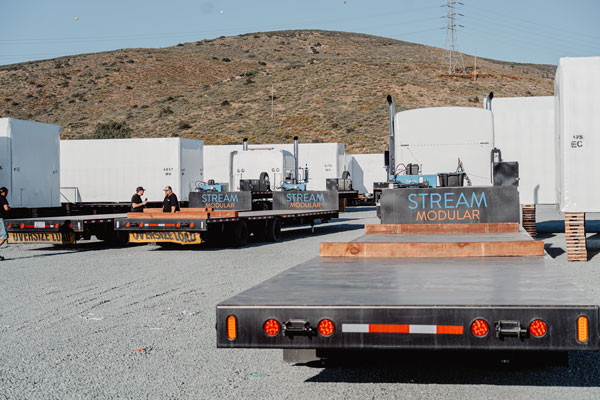Growing interest in volumetric construction is resulting in more and ever-larger modular projects being conceived and designed across North America.
Critical to the success of the volumetric modular process is the movement of units from the factory to the site. Deliveries must be on schedule and arrive in the right order without damage. Any mix-ups add time and expense undermining the overall integrity of the process.
Manufacturing facilities are rarely near the building site. That means transporting large numbers of large pieces long distances.
Volumetric builders are increasingly looking to third party freight companies, not only for the specialized trailers suitable for oversized volumetric units, but also for the logistical solutions required to keep fast-moving modular construction projects progressing on time.
For example, , with offices in Ontario, Alberta and British Columbia, has been working with Calgary-based for several years, transporting volumetric pieces as far as Texas.
in Brantford, Ont., also uses a third party for transport. The company is currently planning the logistics required to move more than 1,800 units from their factory to a tight urban setting in Toronto.
Given the distances between the factory facility and the jobsite, both Docktor and ANC told the Daily Commercial News that municipal, provincial and international permitting regulations were the biggest single logistical challenge they usually face.

Each state or province has its own idiosyncrasies.
For example, permits in British Columbia are valid for one day, whereas a permit can be valid for up to seven days in Québec. Ontario allows night travel, while others may only allow it when loads meet certain dimensional restrictions. Some provinces require one or more pilot vehicles, while others don’t. Each province has individual oversize dimensional maximums. Overpass heights vary. This makes cross-country or cross-border delivery a complex logistical puzzle.
With volumetric pieces coming off the line with clockwork precision, finished units must clear the factory quickly. And if the units are ready and deliverable before required onsite, there may be a need for a nearby interim staging facility for secure storage. And of course, units must not be damaged either in transit or while in a “transit buffer.” That can result in repair costs and time delays.
No wonder few manufacturers are tackling these logistical challenges in-house and instead are turning to third parties. In fact, alongside the growth of the modular production, an entire new industry of dedicated modular transporters is being created.
An example is , one of the first dedicated, specialized modular delivery and logistical support services in North America.
Although based in Arizona, Stream’s geographic reach extends across the United States and even into Canada. The company does more than simply haul volumetric units. It provides full end-to-end logistic solutions that span the critical gap between manufacturers and project owners.
The key is in the detail. Stream’s services begin with pre-delivery meetings between onsite project managers and the manufacturing personnel. These meetings examine the unique constraints and considerations of each project, beginning with determining which of their specialized trailers is appropriate. A customized “A to B” delivery plan is then developed that will keep the flow of units running on time.
“Modular logistics project planning involves dividing a large project into smaller, self-contained units or modules,” the company says. “Transport for each module is planned, executed and monitored separately. By understanding sequential deliveries, you avoid the segmentation of a logistics project and instead view it as a whole.”
The decision to go with a third party logistics specialist is persuasive when growing volumetric manufacturers take into account their long-term vision and growth. Using a logistics partner like Stream provides scalability without significant capital investment in a fleet. The focus instead can be on manufacturing expertise.
“We understand and own every part of the process,” Stream representatives told the Daily Commercial News. “This comprehensive approach can lead to smoother operations and potential cost savings throughout the project lifecycle.”
John Bleasby is a freelance writer. Send comments and Inside Innovation column ideas to editor@dailycommercialnews.com.








Recent Comments
comments for this post are closed